Like many of my posts, I try to hit upon themes that I hear about all the time from friends, family and people I meet. If I had a bottle of mezcal for every time I am asked “What is mezcal?”, I would have quite a collection. And I have quite a collection – see what I mean?
What is mezcal? Why is everyone talking about it? (well, maybe not everyone – just everyone who knows ANYTHING about ANYTHING!). Mezcal is any spirit that is distilled from an agave – though not everyone can label it as such as you will see below. So tequila is a mezcal, for example, because it is made from the blue agave. What distinguishes mezcal is where it is made in Mexico, the production process, and the types of agaves used. I go into depth on this topic in a variety of previous posts so check out THIS ONE from last August if you want more on this.
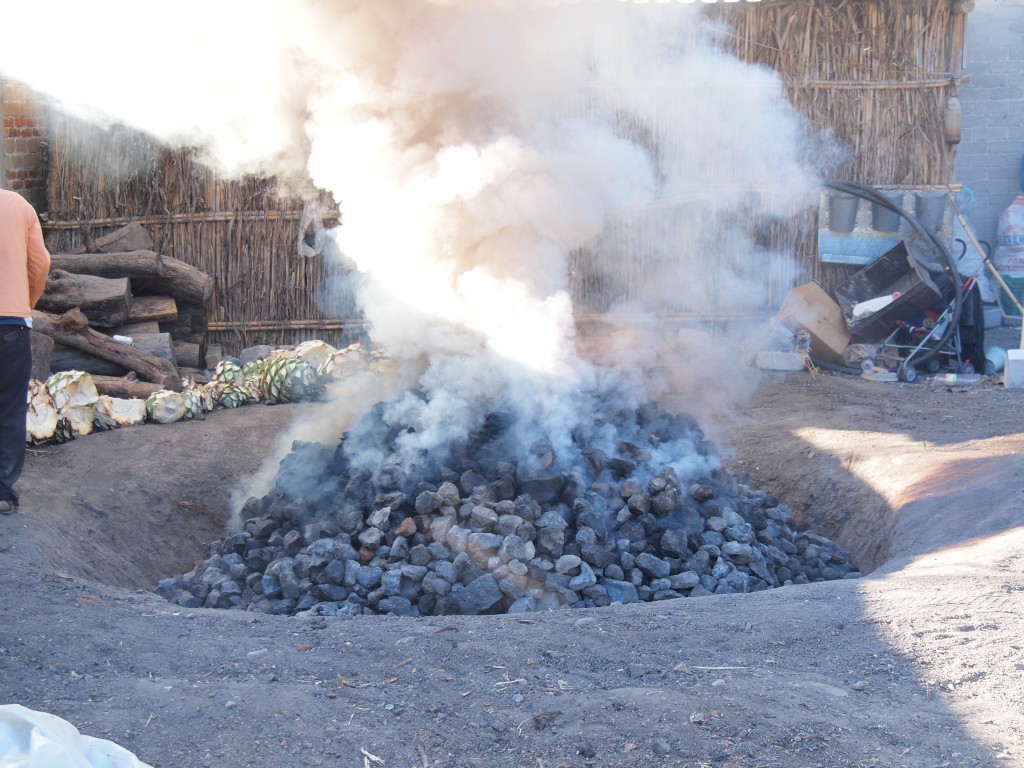
Now on to what I really want to write about in this piece: Why Is Mezcal Happening Now? There is not an obvious answer, and for that reason, I wanted to explore the topic. So let’s start with a bit of background.
I live in NYC and have been a passionate premium tequila lover for close to 20yrs. As the premium tequilas (and I am not talking about the only-margarita-worthy Patron)really began to come to market in the late 1990’s and early 2000’s, I began to get deeper into great tequilas. Then when my wife dubbed me a “tequila collector” I felt I had license to really go nuts, and the bottles really began to pile up!
But mezcal in the late 90’s and first half of the 00’s? It barely existed. I would dabble (and I loved it) when I saw a bottle of Del Maguey, but that was rare. I am talking really rare. Rarer than the NY Post front page without Lindsay Lohan and a bottle of Jack. .
So here we were in say 2005, and mezcal was undiscovered. Del Maguey was the only quality brand to be found. So seven or eight years ago, mezcal was virtually unheard of and you could rarely find it in any bar or liquor store. Now, relatively, mezcal is everywhere: virtually every cocktail bar, top restaurants like 11 Madison and Daniel, mezcal sections in liquor stores like Astor Wines, and even Bed, Bath and Beyond! Well, OK, maybe not….
Now I don’t want to overstate the case because mezcal is also still very much being discovered. As I said, it is relatively everywhere – contrasting it to being nowhere barely five years ago. But what has happened in these intervening years to take mezcal from unheard of to near mainstream?
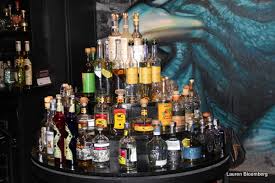
Certification Legitimizes Mezcal
Many knowledgeable people in the spirits/tequila/mezcal world would point to the official regulation of mezcal producers as the primary reason behind the rise of mezcal. While this is definitely true, it is not the whole story, and I have a theory about how the regulation and certification of mezcal was the catalyst for its rise, but is far from the entire story. But first let’s look into certification and what it means. As usual, I am going to get a bit geeky and academic on the subject because that’s just what I do…
In the early 1990’s, Mexico and quality mezcal producers wanted to gain international recognition and protection for the product known as “mezcal”. Why did they want this? They wanted this because a specific international designation provides a product a measure of protection and prestige, which certainly helps it succeed commercially, but also recognizes a product’s culture, history, and extraordinary uniqueness to the region and the area. This recognition is ultimately granted by the World Intellectual Property Organization under the Lisbon Agreement, which is an international agreement that protects an “appellation of origin” (hang on, coming to that) such that the protected product can be made in specific designated areas. The criteria for an “appellation of origin” are:
- First, the requirement that the appellation of origin should be the geographical denomination of a country, region or locality means that the appellation is to consist of a denomination that identifies a geographical entity in the country of origin.
- Secondly, the requirement that the appellation of origin must serve to designate a product originating in the country, region or locality concerned means that, in addition to identifying a place, the geographical denomination in question must be known as the designation of a product originating in that place – requirement of reputation.
- The third requirement concerns the quality or characteristics of the product to which the appellation of origin relates, which must be due exclusively or essentially to the geographical environment of the place where the product originates.
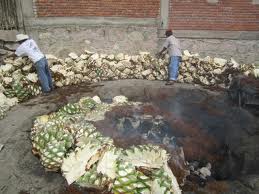
This all makes sense to me and hopefully to you as well. What type of things are granted an “appellation of origin”? Well, Tequila, for example received its appellation of origin in 1978. But many other things have it including Champagne, Gruyere cheese, Prosciutto di Parma, many French wines, Cognac, and Chianti, among many others. And what this means is you can only make that product in that specific place! So you can make sparkling wine in California but you cannot call it Champagne. Or you could make mezcal in Arizona, but you can’t call it mezcal. Got it? So the appellation of origin is HUGELY important in protecting the cultural aspects of a product and the commercial possibilities as well. The Mexican Institute of Intellectual Property, which is the institution in Mexico authorized to declare protection of an appellation of origin within the country, granted Mezcal its “appellation of origin” on November 28, 1994. Following that, on March 3, 1995, the World Intellectual Property Organization granted Mezcal its appellation (appellation of origin number 731 in the Lisbon database if you are scoring at home). As a result, you may hear some say that Mezcal got its appellation in 1994 while others will say 1995. I think 1995 is the one that counts since that is the international stamp of approval. Finally (and a minor point perhaps), a Geographical Indication (GI) is a subset of an “appellation or origin”, and in Mexico a GI is recognized as a Denominacion de Origen, or “DO”. So you will hear people, including me, refer to Mezcal’s “DO”, instead of “appellation of origin”, but they are the same thing essentially and can be used interchangeably. Wow. Nerdsville.And an additional finally, the mezcal DO is somewhat controversial in Mexico because it originally only included 7 states in the DO (now it is 8). So the DO says only 8 states in Mexico can make an agave distillate called “mezcal”. The problem with this is that there are at least 18 more Mexican states that have been making mezcal for hundreds of years, and they were excluded from the DO. Why? A bunch of political B.S. as far as I can tell, but that’s the way it went down.
Now that we are all steeped in appellation of origin knowledge let’s continue the story.
Once mezcal received its DO, it became subject to a law governing mezcal, also known as the standard “NORMA Oficial Mexicana NOM-070-SCFI-1994“, which includes the DO. This law sets forth a variety of the rules and regulations governing, among other things, mezcal production, mezcal types, bottling, marketing, agaves to be used, quality standards, etc. While the details are interesting (to me at least) this blog post would get very long if I went into further depth, so for now check out Mezcaleria, which has the details.
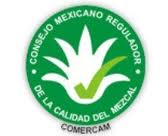 In 1994, this NORMA came into existence but it really was not law – merely a suggestion at this point. But it got everyone moving in the right direction as all producers knew that the law was coming soon (well, not too soon – this is Mexico after all). In 1997, an industry regulatory body was established to apply the law. The regulatory body is known as COMERCAM (“Consejo Mexicano Regulador de la Calidad del Mezcal A.C.” or in English, the Mexican Council for Quality Regulation of Mezcal). COMERCAM is an association of mezcal producers, brand owners and experts. In 2003 the NORMA became law and COMERCAM began to officially certify producers in 2005. Since 2005, only Mezcal bearing the COMERCAM label is officially marketable.
In 1994, this NORMA came into existence but it really was not law – merely a suggestion at this point. But it got everyone moving in the right direction as all producers knew that the law was coming soon (well, not too soon – this is Mexico after all). In 1997, an industry regulatory body was established to apply the law. The regulatory body is known as COMERCAM (“Consejo Mexicano Regulador de la Calidad del Mezcal A.C.” or in English, the Mexican Council for Quality Regulation of Mezcal). COMERCAM is an association of mezcal producers, brand owners and experts. In 2003 the NORMA became law and COMERCAM began to officially certify producers in 2005. Since 2005, only Mezcal bearing the COMERCAM label is officially marketable.
So there you have it. The fuse is lit. But realize that although mezcal received its DO in 1995, mezcal has only been regulated and certified since 2005! If you wonder why mezcal only began to get popular in the past few years, the answer starts right here. It barely existed until 2005. The first official producer of mezcal, Eric Hernandez, was only certified in 2005, though he is a 3rd generation mezcal producer.
There was a survey taken in 2005 that sheds light on what the certification process can do to legitimize a spirit. In 2005 only 23% of Mexicans thought mezcal to be a quality product. By 2008, that number was up to 40%! That is a very short time period to improve the overall image of a beverage, and it started with certification.
A Confluence of Events Drives Mezcal Out of the Shadows
Certification and regulation put the framework in place for why mezcal is happening today. Let’s take a look at what I believe are a few of the other contributing factors.
- Entrepreneurs and Capital. Personally (and it is my blog so I get to put forth my theories first), I think the most important thing that certification did was provide a fertile environment for entrepreneurs. It costs a fair amount of money and resources for a producer to be certified, and many mezcal producers simply cannot afford it. Once certified, it takes capital to create a brand, produce it, bottle it, label it, export it, develop importer and distribution agreements, and market it in the destination markets. Passionate mezcal entrepreneurs have stepped into this arena because they have the capital (well, barely), vision, energy, enthusiasm, and abilities to create a business with the producers. While I do not know the origins of all the brands on the market, I know many of them have been brought to market by entrepreneurs. Now some people might not like this as they disparage the commercialization of mezcal and the pursuit of profits by entrepreneurs. But most of these brands stay true to the artisanal production process, have created jobs in Mexico (and the U.S.), and have brought recognition and awareness to our favorite spirit. Only the very small minded would question these benefits. The other important element that the entrepreneurs bring is evangelical passion. They love mezcal so deeply, so it is not just a commercial enterprise for them. Thus, the entrepreneurs, in my view, gave mezcal the initial boost post certification.
- Mixology. To me, the mixologists followed the entrepreneurs into the fray. Rather, the entrepreneurs dragged the mixologists into the arena. But man, once they got there, they lit it up! I am not sure the mixologists would have ever discovered mezcal were it not for the entrepreneurs and their legions who were out pounding the bars and restaurants on a nightly basis to encourage the recognition of this beautiful elixir. Of course, mezcal arrived on the scene in the late 2000’s as the cocktail craze was in full swing so this helped. As the mixologists discovered its smoky elegance, they embraced what it could do in a cocktail. At least in NYC, in 2009 or so, you rarely saw mezcal on a cocktail menu. By 2011, you could barely find a cocktail menu without a sexy mezcal concoction.
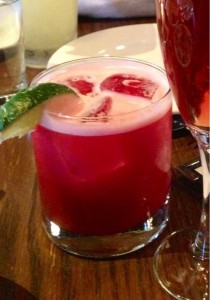
The Rebel Saint at El Toro Blanco The entrepreneurs started it, and the mixologists gave mezcal accelerated visibility. But there were some other things going on in conjunction.
- Cultural Rediscovery. With certification, a cultural renaissance of mezcal began to happen in Mexico. The survey I cited earlier in this post about mezcal’s perception within Mexico drives home this point. Certification provided legitimacy and prestige and Mexicans began to rediscover their cultural roots as they relate to mezcal. Mezcal is part of their national heritage. It was the first distilled spirit in the Americas and has been a part of the Mexican culture for 500 years. It is used in celebrations for births, weddings, funerals, baptisms, birthdays, and virtually every other celebratory (OK, perhaps funerals are not celebratory) milestone that you can think of. This went on for hundreds of years, but somewhere in the 1900’s this crept into the background. Maybe it was the worm. Maybe it was the times. But somewhere in there, mezcal developed a less than stellar reputation (as did tequila by the way) and the pride for this artisanal, beautiful, historic spirit dissipated. So again, it seems that certification slowly (but only over 5 years or so) unearthed a few historical and cultural roots. Today, mezcal is all the rage in Mexico. In Mexico city, high-end mezcal bars are all over the place and even the finest restaurants now have deep mezcal selections. People are proud that this fantastic spirit is part of their heritage.
- Generational Shift. This theme lives comfortably with Cultural Rediscovery, and is an idea put forth by Steve Myers from Ilegal. As premium tequilas grew quite popular, and tequila itself enjoyed a bit of cultural rediscovery in the mid to late 90’s and carried into the 2000’s, it became the drink of the establishment. Simply, it was what your father drank. When mezcal hit the scene in the mid-2000’s, the young saw it as a way to embrace their heritage but not follow in the path of their parents. So the young crowds discovered mezcal and helped drive it to new heights.
- Artisanal Demand and Premium Products. In the past 10 years or so, “artisanal” and “artisan” became new marketing buzzwords – some authentic, some B.S (see Dominoe’s “Artisan” Pie or Tostito’s Artisanal Chipotle Chips). But many people, thankfully, cannot be fooled and they look for truly artisanal products. It began to filter into the mezcal story that mezcals are not mass produced like tequilas. While they have the relatively high price points to evidence that fact, they also have the quality that people expect from artisanal products. Mezcal fits well into rising demand for the themes of small batch, organic, farm to table, hand-crafted, boutique and less industrialized food and drinks. Think about the craft beer movement. And the rediscovery of American Rye and small batch Whiskeys, like Hudson Whiskey. These things have exploded in the past 10 years. This current also has contributed to the growing popularity of mezcal. Mezcal is made on farms. Not in factories.
These are some of the factors that I believe have been integral to the rise of mezcal. Here is a summary: Check out my groovy graphic.
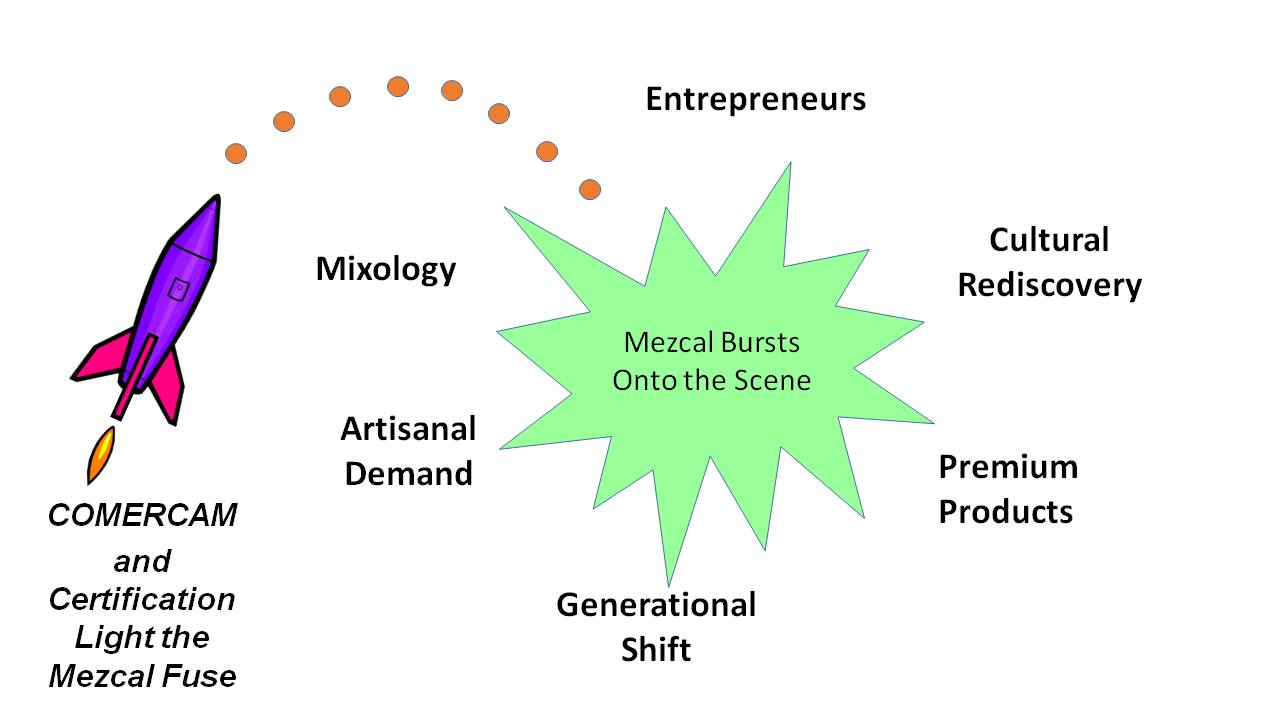
While mezcal is taking off (like a rocket – get it?), I try not to get to ahead of myself and you should not either. Mezcal is still TINY compared to tequila. For every 1 bottle of mezcal sold in the U.S., about 200 bottles of tequila are consumed. Mezcal is shockingly small.
So that’s my take on why mezcal is rising. I hope you have some other ideas to contribute (I know you are out there Matt, Susan, Pedro, John, Steve, Carlos, Arik, Judah, Mario, Jonathan, Doug, Richard and more). Send me your thoughts, and in the meantime, DRINK MEZCAL!


[…] Mexican Standards (NOM) were put into place. Mezcal production was fully regulated and certified by 2005, when these standards would become law. Given the luxury of hindsight, this could easily be […]
THANK YOU enormously for this article! My husband and I are working on starting a mezcal company, working only with small-batch, artisanal producers. He is a native from Guerrero and has a family history of mezcal (producing, selling, and drinking, of course), but I’m relatively new to it. Trying to interpret Noel’s Spanish-English explanation of the COMERCAM and the process is always a bit tricky. This article completely cleared it up for me.
I’ve been reading/hearing about small producers starting a legal fight with the COMERCAM, because they’ve essentially marginalized the vast majority of mezcal producers. Most mezcaleros can’t afford to get certified, and as you say, most states aren’t authorized to sell their mezcal labeled as such. (See this article: http://bit.ly/1zUtpg3).
Noel and I are working on launching our own brand, which we plan to have as an association of mezcaleros. We’ll need to work with the COMERCAM, but we really want to support those marginalized mezcal producers. It will be an interesting journey, no doubt!
We’re currently crowdfunding to launch Phase I of our project. See here: http://bit.ly/WXxQc9
I’ve referred to your blog multiple times – I really appreciate your mezcal nerdiness! Gracias!
Super cool! For even more info you should buy my book (on Amazon – just search “mezcal” and it is first). I have an appendix with some economic info that you may find interesting as well. Good luck with your brand and let me know if you get it launched. Love to try it!
Best,
John
Very interesting article
I am doing a research on mezcal production and demand.
Mezcal production and demand are shooting up like a rocket, and barely in 2005 got out from the shadows…
I live in the US, but am originally from Mexico, from the “world capital of mezcal” a town in Oaxaca, Mexico known as Santiago Matatlan Tlacolula, Mexico. That’s where mezcal original is.
Anyways my dad’s dad used to be a big producer of mezcal, until he died and left everything on my uncles hands(I don’t really want to go into the topic )
My dad also used to produce mezcal…(am go straight to the point am trying to go)
My dad found a way to make Mezcal 100% all natural (mezcal is natural, but throughout the process of the preparation there’s a point where it stops being 100% natural am not sure about the quality of the best mezcal out there but, am sure that my dad’s mezcal one day is gonna hit the market and we are working on it, we don’t have a big capital on our hands to start off with out project but we will one day.
Thanks for the info
Thanks for the comments. Good luck with your mezcal!!
You are in a complete mistake. . Although mezcal was “unheard” by you .. it was not discovered in 2005.. but until 400 b.C. Just to let the audience knows about the real history of Mezcal and not get confused. Im a mezcal producer and Mexican entrepreneur as well.. you can reach me at roberto.juarez@juvbros.com for more details about mezcal.
Regards
I think you are reading my words too literally, and I am pretty sure my audience is not confused. Read my book, Holy Smoke! It’s Mezcal! and I think you will be pleased!
[…] why the sudden interest in mezcal? The Mezcal PhD blog has some great insight, and according to it, “Mezcal has only been regulated and certified since […]
Great article! I, like others, await your book….yes, there is market space for a well written book about mezcal…
Gracias amigo. So many things to do….so little time to drink mezcal….
well Mr John, thank you again for a very interesting piece. The writing style looks very familiar. It seems I may have read some of your “stuff” earlier. I am a novice as is my knowledge and it is always refreshing to hear from the educated class. Keep ’em coming
Earl! How are you? You have forgotten more about mezcal than I will ever know. If I am the “educated” class, we are all in trouble. Keep reading and keep drinking mezcal!!
John – here in Mexico – first drink ordered here was Mezcal Margarita at our favorite restaurant in Bucerias outside of PV. Loved the taste testing blog, which I reread down here since I printed it out. Enjoy these bits of history – when is the book coming out. Craig
Have a great time down there! Need more time in my life for the book! Barely enough time to drink…..
Good post. I would clarify though that some entrepreneurs are in the mezcal just for business reasons without caring for the palenqueros. Some big mezcal names are examples of this.
Another fact that ignited mezcal’s popularity is that it was consumed by artists and bohemians in Mexico city (and Guadalajara, as well), it was referred to in the classic book Under the volcano” decades ago. A crucial point is that today’s Mexicans from 20’s to mid 30’s are proud of their origins in a different way that previous generations, so at the same time that they value their origins they have a proactive way of thinking and are developing a new cutting edge mexican identity.
This generation blends well with entrepreneurs in their 40’s – 50’s and had helped the introduction of mezcal into the Big mexican cities and later on into some cities abroad. Among this generation of youngsters and young adults there is of course the good and the bad, since some of them do it just for business while others primarily for passion that lead to a fair and honest partnership with the palenqueros.
Good bartenders had picked up mezcal long before the time you say in your article, but since it was not available it was no good for driving a business in which you need consistency both in the product and in the supplies chain reliability. I remember there was Sotol from Chihuahua even back in 2003….Yet Tequila proved reliable and had interesting products, but since today they all taste more or less the same and the interest had fade away, mezcal is filling that gap. Sadly there are great tequilas that don’t do it outside of Mexico, as well s with mezcales. Yet this is part of the mysticism that drives its popularity…who doesn’t want to have a little of something difficult to have access to? just like scotch popularity back in prohibition era…I believe.
cheers, LR
Appreciate your thoughts. Here are some comments to your comments:
* We can have an offline discussion about who you think is in it just for the money (mostly, I am just curious). Personally, I am a capitalist, so I am acutally OK with people being in it for the money AS LONG AS they respect their business partners, act ethically, and show loyalty. All of which means treating the paalenqueros fairly, among other things. From what I know of the significant brands that have gained traction, this applies to alomost all of them, which is good.
* Love your comments on the new generation and their forging of a new Mexican identity. Things frequently start with artists, hipsters, and bohemiams. If you have read Tipping Point, the discussion of Hush Puppies and the East Village of NYC certainly applies.
* On your final points, agree with all! Well said.
Wow. What a great mezcal primer. That’s more than a primer, in fact. That’s a really valuable blog post.
We have over 70 mezcals at here at Liberty in Seattle, but even if we just had 10, the story would be the same every day, “What’s mezcal, again? That’s like tequila, right?”
One last issue that contributed towards the almost over-night acceptance of mezcal is the development of the palates. I suppose that goes under the “mixologist” part, but scotch has come & gone, bourbon & rye were interesting for a long time, tequila was romantical…but now, mezcal a never-ending broadening of the palate. Every batch, every season, the flavor changes, so while people may have been used to the perfectly dependable, perfectly crafted whiskies & tequila, mezcal is a brave new world.
Over 70 mezcals? I need to make a trip to Seattle. How many brands are represented? And I have not thought about the palate pusuits but what you say makes sense. This is definitely true for me. While I love tequila, my brain and palate were searching for more. Enter mezcal….
Mezcal was recently and incidentally involved in a public scandal in Mexico. As was reported in The New York Times, “Andrea Benítez simply did what many rich, connected Mexicans have always done: she used her influence to step on the lower born. Witnesses said that when she was not given the table she wanted on Friday at Maximo Bistrot, a popular Mexico City restaurant, she called in inspectors who worked for her father at the country’s main consumer protection agency to shut it down.”
Officially, the complaint was that the reservation system was not clearly posted AND THAT THE MEZCAL did not “meet the norms”. Versions of the story vary. Some say that the complaint consisted in that the agave used was out of the norm, other news programs said that the problem was that the capacity of the bottles (750 ml) was not listed.
Anyway, the NYT adds: “What followed, however, caught much of Mexico by surprise. Instead of enjoying the perks of privilege, Ms. Benítez and her father have become the targets of a broad and swift social media campaign — with tens of thousands of Tweets condemning them — that led the president’s office on Monday to announce a formal investigation into allegations of abuse of power.”
Very interesting. It seems times are a changin’ in many ways in Mexico! And with things like this, it is clearly for the better.
True. At least the story proves that mezcal has truly arrived at the most sought-after tables in Mexico.
another awesome article…thanks!!!
Very kind. Thank you. I had fun putting it together.
After what you wrote in this blog…. Who needs to read Mezcalaria by Ulises Torrentera? Thanks for all the interesting and well written information.
My biggest fan! Thank you. Yes, that book is disappoining. Mine will be better!